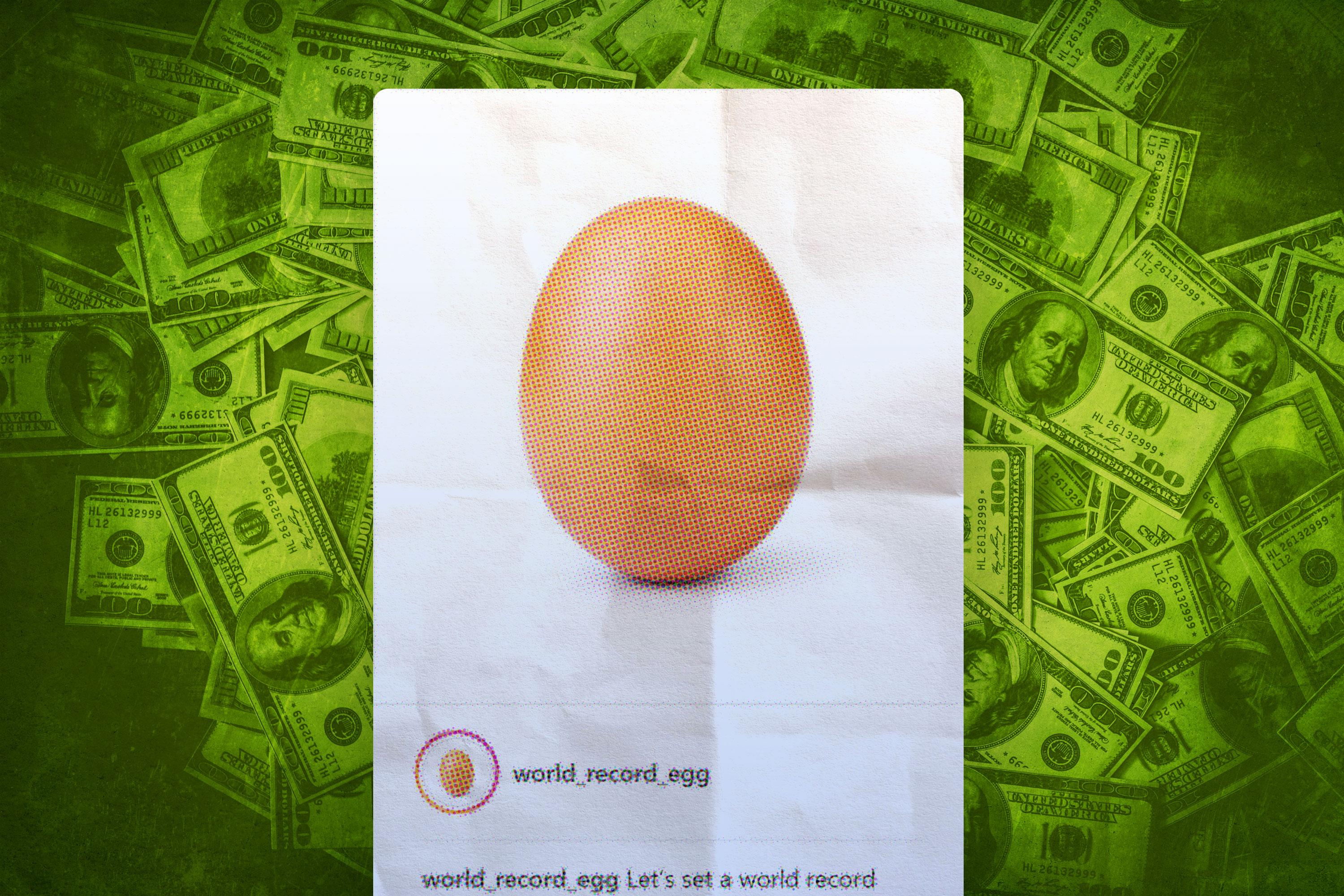
On Monday, the internet rejoiced as a brown egg stole the Instagram “likes” throne from Kylie Jenner. A February 2018 photo posted by the Kardashian clan member held the title of most-liked image on the photo-sharing platform, until someone—identity still unknown—decided to harness his or her powers to … promote an egg.
The plan worked. @world_record_egg now has the most popular post on Instagram, more popular, even, than a photo of Kylie holding the hand of her newborn baby. The Egg gave the internet a rare moment of joy; social media is so preoccupied with influencers, personal branding, and carefully curated celebrity content that the idea of an egg—just a regular, boring, brown egg—usurping the likes of Kylie Jenner felt like a win for everyone.
On Tuesday, Slate wrote that The Egg’s win was “a refreshing break from the modern viral internet,” and it was. But that moment was short-lived, because The Egg quickly came to represent everything it seemed to criticize. The original “Egg Gang” quickly began selling official “Egg Gang” merch online. Etsy stores also jumped on the bandwagon with egg merch—as did Amazon, which swiftly filled its inventory with Egg-related items. And then there were the hundreds of Instagram accounts that changed their handles and profile photos to incorporate or even completely copycat The Egg in hopes of promoting their own brands. There is also now a black egg, which wants to “beat the lightskin egg IN THE NAME OF EQUALITY,” according to its Instagram bio. “Put the egg on your story for a shoutout,” it asks.
In fact, a Twitter account that only became active on January 14, @egg_rt_record, is now vying to top a Japanese billionaire’s record of more than 4 million retweets.
As Wired points out, this isn’t the first time that an inanimate object has vied for and won social media virality over the people and topics that have an often unfortunate hold on our attention. There was the white onion half that wanted to take down Donald Trump and the viral Kickstarter for potato salad. There’s something heartening about seeing the plain and pointless cut through the cutthroat superficiality of the social media void. And how The Egg went viral was refreshing: It wasn’t as if regramming it was an option (that doesn’t garner an Instagram post more likes or count toward … anything, really), and it doesn’t appear as if the account holder bought likes. Friends sent Instagram DMs to other friends or tagged them in the comments of the post, urging them to help The Egg break the record. “I guess it’s also a comment on celebrity culture and how fragile and easily cracked it is (pun intended),” The Egg’s account holder, who will only reveal that he or she lives in London, told ABC 7 news. “But really I just thought it would be funny if something as simple as an egg could take the crown.”
It would be, and it was. Unfortunately, as quickly as this all happened, the very thing worth celebrating became a catalyst for the type of social media activity we’re so weary of. It’s as if the internet has an infection, and anything simple and innocent and stupid and without agenda can’t sustain its innocence for more than a moment. Another recent social media trend started harmlessly: the 10-Year Challenge (also known as How Hard Did Aging Hit You). It began as a simple way to broadcast a glow-up, comment on your ageless-ness, or mock the whole concept completely with photos of people or things other than yourself. It was a fun and pointless endeavor reminiscent of MySpace surveys. But then a handful of security advocates and writers cautioned that the photos being uploaded to Facebook and Instagram are now owned by Facebook, and that the company could use them to advance its AI systems, allowing them to better understand how human faces age. Facebook could use such technology positively, e.g., to find missing people, or all that data could be extracted by a Cambridge Analytica type to target and manipulate. Ultimately, the challenge that made everyone remember a time when Facebook was fun could be feeding the beast it is today. The company denied it had anything to do with the photo challenge, but the warning wasn’t totally out of place in Facebook’s ethical wasteland.
Of course, it is a good thing that users are becoming wiser to the ways in which social platforms can be used to take advantage of them. Influencer culture has infected the internet to a great extent, and it’s taken time for the world to understand its manipulations. Just this week, Instagram influencer Caroline Calloway was promptly derided for her $165-ticket seminar tour that some attendees said promised much and delivered little. The speed at which Calloway’s unintended “scam” was revealed is likely thanks to the fact that this type of ploy is quickly becoming an old story; Calloway’s failed seminar is not an isolated incident. In total, the positive side of this skepticism is that fewer people will fall victim to similarly nefarious plots—the downside is that the internet joyfulness window is getting smaller and smaller. The owner of the original egg account remains anonymous, but is clearly reveling in the account’s sudden and likely temporary fame. (Next, the Egg Gang is lobbying Apple for a brown egg emoji.)

The best part of The Egg was the lead-up to its victory, when it existed primarily in private messages and Instagram comments—the internet equivalent of whispering to your friends. Now, everyone wants a piece of it. And so, just as suddenly as The Egg delighted the internet, it overwhelmed it. Because, as it turns out, even an egg is exploitable.